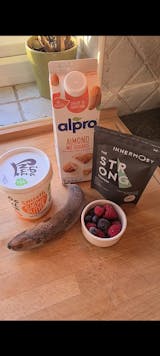We all know that gut health is hugely important for the body. The millions of bacteria in your gut are the good kind, not the gross kind, and they affect many things which keep you healthy, such as communicating with your immune system to help you fight off infection and disease and producing vitamin K. They affect how the food you eat is digested, which nutrients you’re able to absorb and how energy is stored in your body. In short, gut bacteria and gut health is crucial.
A new study has suggested that your gut microbiome could be one of the culprits behind the inflammatory symptoms which contribute to long haul COVID-19. The study, which was published in Gut medical journal, explained the potential link between the gut microbiome and COVID-19.
Dr. Siew Ng, lead researcher for the study and a professor from the Institute of Digestive Disease at the Chinese University of Hong Kong, said: ‘Imbalance in the microbiome contributes to the severity of COVID-19, and if it persists after viral clearance, could contribute to persistent symptoms and multisystem inflammation syndromes like long COVID syndrome.’
‘Restoration of the missing beneficial bacteria might boost our immunity against SARS-CoV2 virus and hasten recovery from the disease,’ she continued. ‘Managing COVID-19 should not only aim at clearing the virus, but also restoring the gut microbiota.’
However, Dr Ng also said that it can’t be proven yet that microbiome imbalances cause the disease to be more severe, just that it seems there is an association between gut bacteria and the well-known virus.
Despite this, there’s more evidence all the time that the bacteria found in your gut are linked to many kinds of inflammatory diseases, Dr Ng commented. In the study, researchers examined stool and blood samples from patients both with and without COVID-19 and discovered that the two kinds of samples were significantly different. In addition, it didn’t seem to matter if the patients had been given drugs, or even antibiotics.
The samples from those with the virus causing the pandemic had less of the bacteria that has been found to affect the immune system, and the lower numbers of these kinds of bacteria was linked to how severely the patients suffered with the infection. Even after they had recovered, it took up to 30 days for the bacteria to start regenerating within their guts.
The reason behind this is that COVID-19 triggers our immune systems into making cytokines, which are inflammatory. In people where this response is excessive, it can cause tissue damage, sepsis and even organ failure.
Dr. Arun Swaminath, chief of the division of gastroenterology at Lenox Hill Hospital in New York City, was not part of the study but noted that the microbiome of our gut reacts to many conditions that may or may not be related to the virus sweeping the world.
‘It's pretty clear that stool biodiversity does change in response to many things, including age, diet, underlying autoimmune disease and antibiotic exposures,’ he said.
‘Some of the early published data among populations with altered gut microbiomes, such as patients with inflammatory bowel disease who are infected with COVID-19, do not experience worse outcomes compared to the general population, so the idea of having altered gut microbiome at baseline doesn't seem to imply worse inflammation from COVID-19,’ he continued.
‘However, Ng's work may help us identify those who haven't recovered from COVID-19 infection using stool biodiversity testing.'
Looking to look after your gut?
Keep your microbiome in check with The Digest Capsules, daily capsules containing probiotics and prebiotics to encourage the growth of good gut bacteria, with digestive enzymes and ginger to improve digestion and reduce bloating. Get healthier from the inside out.























